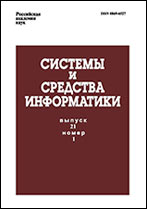|
This article is cited in 3 scientific papers (total in 3 papers)
On the comparative genesis of basic information technologies and socioeconomic formations of the Humankind
S. N. Grinchenko
Federal Research Center "Computer Science and Control" of the Russian Academy of Sciences, 44-2 Vavilov Str., Moscow 119333, Russian Federation
Abstract:
From the standpoint of informatics-cybernetic modeling of the development process of the self-controlling hierarchical-network system of Humankind, the parallelism of the processes of the genesis of basic information technologies (BIT) and socioeconomic formations (SEF) of Humankind is considered. The period of the formation of BIT signal poses / sounds / movements (“pre-pre-human” Hominoidea) corresponds to the SEF with the working title “pre-pre-primitive communal formation,” the period of the formation of BIT mimics / gestures (“pre-human” Homo erectus) — SEF “pre-primitive communal formation,” the period of formation of BIT of speech / language (human Homo sapiens-1) — SEF “primitive communal formation-1” (PCF), the period of formation of BIT writing / reading (Homo sapiens-2) — SEF “Feudalism-1 + PCF-2,” the period of formation of BIT of replicating texts / printing (Homo sapiens-3) — SEF “Capitalism-1 + Feudalism-2 + PCF-3,” the period of formation of BIT local computers (Homo sapiens-4) — SEF "$\alpha$-Digitalism-1 + Capitalism-2 + Feudalism-3 + PCF-4," the period of formation of BIT of telecommunications / networks (Homo sapiens-5) — SEF "$\beta$-Digitalism-1 + $\alpha$-Digitalism-2 + Capitalism-3 + Feudalism-4 + + PCF-5," the period of formation of a promising nano-BIT (Homo sapiens-6) — SEF "$\gamma$-Digitalism-1 + $\beta$-Digitalism-2 + $\alpha$-Digitalism-3 + Capitalism-4 + Feudalism-5 + PCF-6," etc. The characteristics of the corresponding management structures are given: from “pre-pre-democracy” within the family to the promising "democrat–autocrat–oligarch–$\gamma$-arithmocrat-3–$\beta$-arithmocrat-2–$\alpha$-arithmocracy-1" within the Intermediate Space.
Keywords:
basic information technologies, socioeconomic formations, informatics-cybernetic model, self-controlling hierarchical-network system of Humankind, systemic genesis, systemic cumulation principle, systemic consistency principle.
Received: 28.11.2021
Citation:
S. N. Grinchenko, “On the comparative genesis of basic information technologies and socioeconomic formations of the Humankind”, Sistemy i Sredstva Inform., 32:3 (2022), 147–155
Linking options:
https://www.mathnet.ru/eng/ssi850 https://www.mathnet.ru/eng/ssi/v32/i3/p147
|

|




 Contact us:
Contact us: Terms of Use
Terms of Use
 Registration to the website
Registration to the website Logotypes
Logotypes







 Citation in format
Citation in format 
